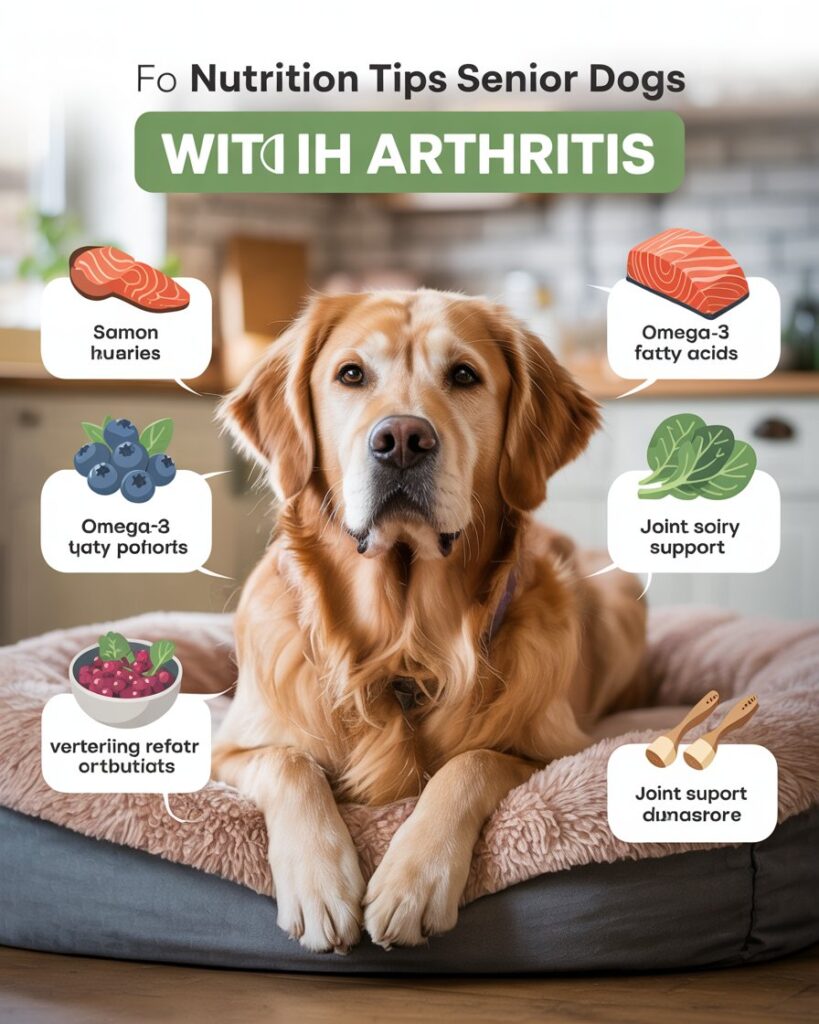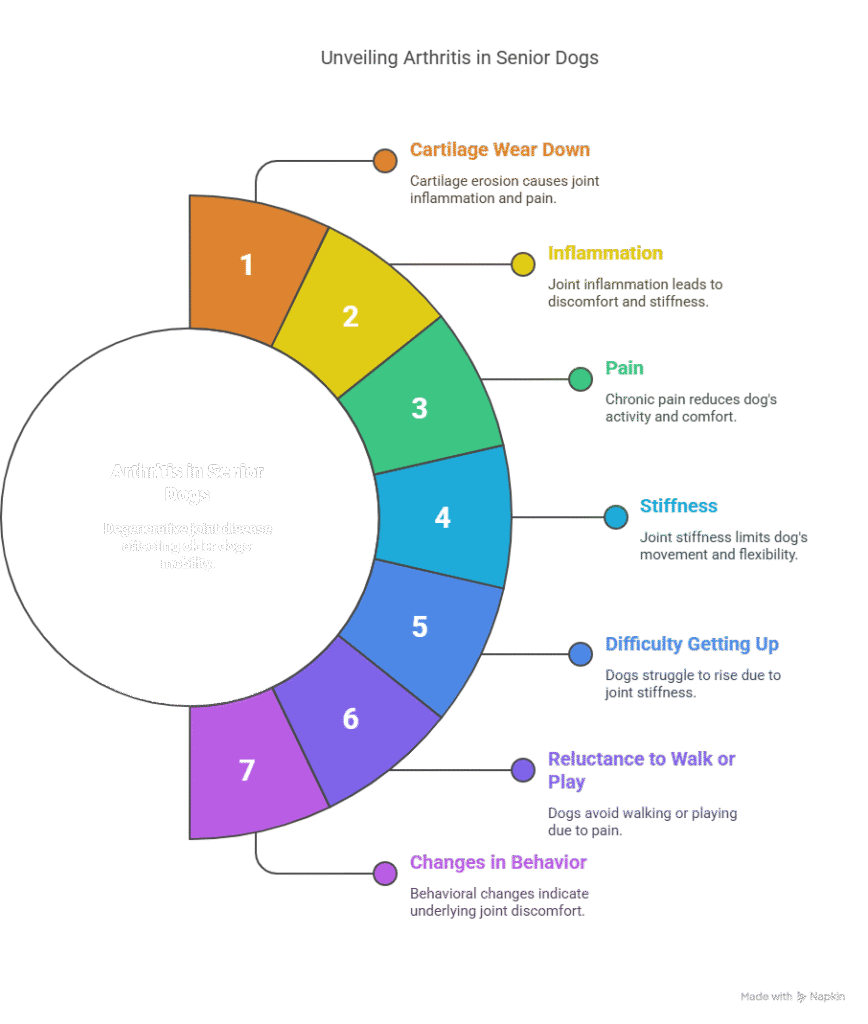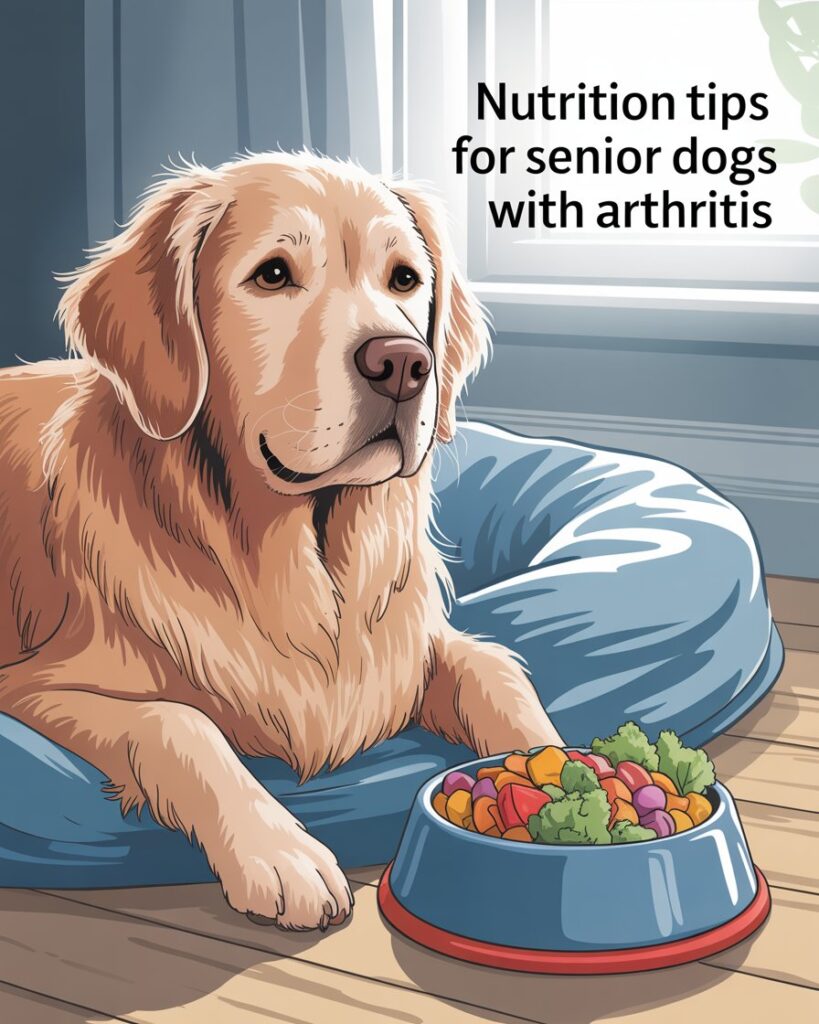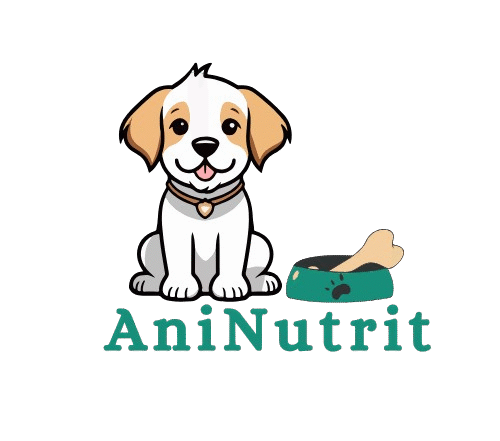Most people do not realize how common elderly dogs with arthritis and joint inflammation. As dogs age, their joints undergo progressive changes which makes movement difficult and sometimes painful. Luckily, diet can make a substantial difference. With the right nutrition, supplements, and diet, you can improve joint health, reduce joint inflammation, and increase the quality of life in your senior dog. Using simple guidance and effective methods, we will explore five dietary elements of managing arthritis in senior dogs within this article.
In addition, lean protein like chicken or turkey helps maintain muscle strength without putting too much weight on aching joints. Obesity makes arthritis worse, so feeding the right portion size is essential. Also, try adding antioxidant-rich vegetables such as carrots, spinach, or blueberries to your dog’s meals to reduce joint inflammation naturally. Avoid high-fat treats and foods with artificial additives, as these can trigger more swelling and weight gain.
1. Choose Anti-Inflammatory Foods to Ease Joint inflammation

When it comes to managing arthritis naturally, the best place to start is with anti-inflammatory foods. These help reduce swelling and pain in your dog’s joints, allowing them to move more freely.
Include Omega-3 Fatty Acids
Nothing tackles joint inflammation like omega-3 fatty acids. Found in fish oil, salmon, sardines, and even flaxseed, these compounds reduce pain while improving mobility by cushioning joints. Furthermore, sardines can provide older dogs with additional benefits, supporting brain and heart health. You can add omega-3s to your dog’s diet through high-quality fish oil supplements or by feeding them sardines packed in water (not oil or salt). Be sure to consult your vet for the right dosage, especially if your dog is already taking other medications.
Packed with antioxidants, bright-colored vegetables such as carrots, sweet potatoes, spinach, and kale tend to be overlooked. Antioxidants fight free radicals that can worsen joint inflammation damage over time. Lightly steaming these vegetables not only helps with digestion but also aids nutrient unlockage.
2. Manage Your Dog’s Weight for Joint inflammation Relief
Adding fish oil supplements is a great way to increase omega-3 levels in your dogs. Alternative options include feeding them sardines packed in water (not oil or salt).
Feed Controlled Portions
Overfeeding is a common issue with senior dogs who are not active with joint inflammation. Although they might give you those irresistible puppy eyes, it’s best to stick to portion-controlled meals. Use a measuring cup or kitchen scale to ensure accuracy. Many senior dog foods are formulated with fewer calories but include nutrients that promote joint inflammation health.
Choose High-Fiber, Low-Calorie Foods for dogs
Low-calorie diets also add in your dog’s diet for healthy and promote joint health. In fact, you can keep your dog satisfied with high-fiber ingredients like pumpkin and green beans also brown rice. Keep in mind that weight loss should be gradual. Rapid weight changes can be dangerous, especially in senior pets. Always consult your vet before making significant changes to your dog’s diet.

3. Focus on Joint-Supporting Supplements
healthy food is the foundation of good health but supplements can give your senior dog the extra boost they need. There are many natural joint supplements available that can help rebuild cartilage and reduce joint inflammation.
Glucosamine and Chondroitin
These two supplements are the most popular and researched for joint inflammation. They work together to rebuild cartilage and improve joint lubrication. They are often found in joint chews or powders and safe for long-term use.
MSM and Turmeric
Methylsulfonylmethane (MSM) is a natural anti-inflammatory that works well alongside glucosamine.Turmeric also work especially when combined with black pepper extract. Turmeric is another natural anti-inflammatory with powerful pain-relieving properties.
4. Provide Easily Digestible Protein Sources
Protein is crucial for maintaining muscle mass especially in aging dogs. as dogs grow older their ability to digest heavy meats may decline. To support lean muscle without overloading the digestive system it’s important to choose high-quality easy-to-digest proteins.
opt for Lean Meats
Chicken, turkey and white fish are excellent choices for lean meat. These lean meats provide essential amino acids that support muscle maintenance without adding too much fat or strain on the kidneys. If your dog has kidney concerns consult your vet about the ideal protein levels.
Add Bone Broth
Bone broth is more than just a tasty treat. Bone Broth rich in collagen gelatin and minerals that promote joint gut and skin health. Serve warm over your dog’s kibble or use it to moisten dry food for better palatability. Bone broth is also easy to make at home not add onion, garlic, or too much salt, as these can be toxic to dogs.for more details visit my youtube channel:

5. Hydration and Meal Timing Matter
Regular hydration and proper meal timing can help reduce stiffness and support energy levels throughout the day.
Encourage Hydration
Proper hydration helps your senior dogs with keep joints lubricated and supports kidney function. If your dog isn’t drinking enough water, you can add water to dry food. offer wet dog food or include moisture-rich foods like watermelon and cucumber for joint inflammation.
Final Thoughts: Gentle Nutrition Goes a Long Way
Feeding a senior dog with arthritis isn’t just about giving less food it’s about giving better food. By choosing anti-inflammatory ingredients maintaining a healthy weight supporting the joints with quality supplements. This nutrition offering lean proteins and focusing on hydration and also timing you can make a real difference in your dog’s comfort and mobility. Although arthritis can’t be cured, these natural nutrition tips can slow its progression and help your beloved dog stay active and happy for as long as possible. Always work with your veterinarian to tailor a diet plan that meets your dog’s specific needs, especially if they have other health issues. By following these nutrition-focused approaches you’re not only supporting your dog’s physical health but also giving them the loving care they deserve in their golden years. you also read about.
Recipes
1. Omega-3-Packed Salmon & Sweet Potato Bowl
Benefits: Rich in anti-inflammatory omega-3s and vitamin-rich sweet potato for energy and gut health.
Ingredients:
- 1 cup cooked, boneless salmon (wild-caught preferred)
- ½ cup mashed sweet potatoes (no seasoning)
- ¼ cup steamed spinach
- 1 tsp ground flaxseed (optional for extra omega-3s)
- Instructions:
Cook the salmon thoroughly and flake it into small pieces.
Steam and mash the sweet potatoes.
Steam spinach until soft and chop finely.
Mix all ingredients together and serve lukewarm.
2. Turmeric Chicken & Brown Rice Stew
Benefits: Turmeric helps reduce inflammation; brown rice adds fiber for better digestion.
Ingredients:
- 1 cup cooked chicken breast (skinless)
- ½ cup cooked brown rice
- ¼ cup chopped carrots (steamed)
- ¼ tsp turmeric powder
- 1 tsp coconut oil (helps absorb turmeric)
- Instructions:
Cook chicken thoroughly and chop finely.
Mix chicken with cooked rice, steamed carrots, and turmeric.
Add coconut oil and stir while warm.
3. Lean Beef & Pumpkin Power Mix
Benefits: Lean beef provides protein; pumpkin is great for digestion and weight control.
Ingredients:
- 1 cup lean ground beef (grass-fed if possible)
- ½ cup canned plain pumpkin (no sugar or spices)
- ½ cup green beans (steamed and chopped)
- 1 tbsp bone broth (low-sodium)
Instructions:
Cook beef until fully browned. Drain excess fat for joint inflammation.
Steam green beans until soft and chop.
Mix all ingredients together with warm bone broth.
4. Sardine & Quinoa Joint-Support Bowl
Benefits: Sardines are rich in omega-3s and calcium; quinoa adds easy-to-digest protein for joint inflammation.
Ingredients:
- 1 can sardines in water (no salt, no oil)
- ½ cup cooked quinoa
- ¼ cup shredded zucchini (lightly steamed)
- 1 tsp ground chia seeds
Instructions:
Drain sardines and mash lightly.
Cook quinoa and steam zucchini.
Mix all ingredients and serve at room temperature.

5. Bone Broth Veggie Soup for Stiff Joints
Benefits: Bone broth contains glucosamine and collagen; veggies offer antioxidants.
Ingredients:
- 1 cup unsalted homemade bone broth
- ¼ cup finely chopped carrots
- 1 cup finely chopped celery
- ¼ cup chopped kale or spinach
- 1 tbsp plain cooked chicken
Instructions:
Bring bone broth to a simmer.
Add vegetables and chicken; cook for 10–15 minutes.
Cool before serving and serve over dry kibble or as a meal topper.
Tips for Serving These Recipes:
- Always serve meals lukewarm, not hot.
- Store leftovers in the fridge for up to 3 days.
- Introduce new meals gradually to avoid stomach upset.
- Consult your vet to adjust portion sizes and protein levels based on your dog’s size and health status.
conclusion:
Senior dogs with arthritis need special care, especially joint inflammation when it comes to their diet. The right nutrition can help reduce joint inflammation, support joint health, and improve overall mobility. First, it’s important to include foods rich in omega-3 fatty acids, such as fish oil or flaxseed, because they can ease joint stiffness and pain. Glucosamine and chondroitin are also key supplements that support cartilage repair and may slow the progression of arthritis. You should look for dog foods labeled “joint support” or “senior formula,” as they often include these helpful ingredients.
Lastly, always make sure your dog has easy access to fresh water and consult your vet before starting any new diet or supplements. With a little extra care, the right nutrition can make your senior dog feel more comfortable and active every day.


